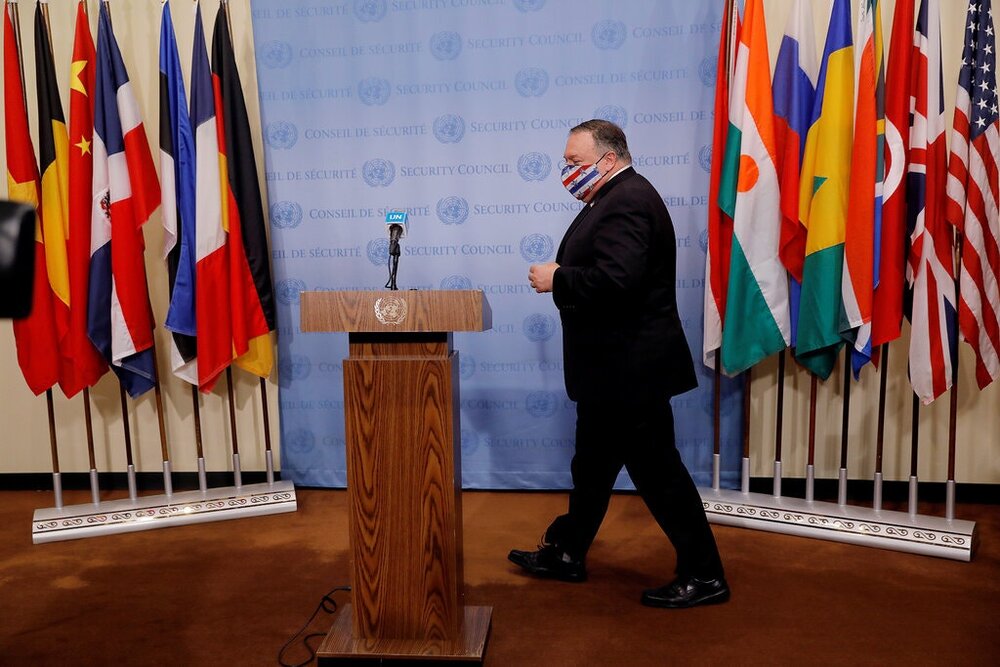UN Secretary-General Antonio Guterres received U.S. Secretary of State Michael Pompeo at his residence in New York on Thursday. The reason for meeting at Guterres' residence is quoted because the UN chief is currently staying in a 14-day quarantine after his recent travel to Portugal. Pompeo was expected to begin the process of triggering snapback sanctions on Iran after failing last week to get the UNSC to pass a resolution to indefinitely extend the Islamic Republic's arms embargo.
Pompeo was also to meet with the Indonesian UN Ambassador Dian Triansyah Djan, who holds the rotating Security Council presidency in August. The Council's presidency is held by each of the members in turn for one month, following the English alphabetical order of the member states' name.
In a phone conversation on Thursday with Guterres, Iranian foreign minister Mohammad Javad Zarif denounced the illegal U.S. push to reinstate the UN sanctions on Tehran via triggering a snapback mechanism. Zarif pointed out that such a step would have dangerous consequences for international law and will damage international mechanisms and discredit the Security Council.
Meanwhile, Iran's newly appointed foreign ministry spokesman, Saeed Khatibzadeh, told reporters Friday about the status of the illegal U.S. move and rejected some foreign media reports that upon request by Washington, the UN sanctions have been reinstated.
In the August 14 UNSC vote, the U.S. managed to get only one vote besides its own. The Dominican Republic lent its support only to act as a polite gesture for Pompeo's August 16 visit to the Caribbean nation. Almost every other 11 Security Council members are mainly U.S. allies and abstained, while China and Russia voted no. Nine votes represent a qualified majority necessary to adopt the agenda.
The UK, France, and Germany have already said the U.S. did not have the legal right to trigger snapback sanctions because it exited the deal on May 8, 2018.
The snapback procedure is outlined in UN Resolution 2231, which endorsed the 2015 nuclear agreement (JCPOA) which stipulates that if one of the signatories finds another to be insignificant non-performance of commitments, the UNSC would have to vote on whether to continue with the suspension of the economic sanctions against Tehran.
Other JCPOA participants and former Obama administration officials say the U.S. no longer has the right to initiate the snapback provision because it unilaterally withdrew from the nuclear agreement.
Another major obstacle along the way for Pompeo would be objections and a possible veto from China and Russia on the provision.
In a letter to the UN in June, Chinese Foreign Minister Wang Yi wrote, "The United States, no longer a participant to the CPOA after walking away from it, has no right to demand the Security Council to invoke a snapback." His Russian counterpart, Sergei Lavrov, took a similar line in a letter of his own last May saying the U.S. stance recalls the expression about "having one's cake and eating it."
The U.S. administration disputes that reasoning, arguing despite exiting the deal, it remains an original JCPOA participant and is also a permanent member of the UNSC, whose resolution 2231 endorsed the deal.
The main reason why the U.S. so hell-bent on provoking such aggressive measures against the Islamic Republic is that the Trump administration wants to kill the JCPOA before the November 3 U.S. elections. Such an outcome will not help Trump get re-elected, but at least he will do all the possible damage before his departure.
What Trump is stubbornly refusing to understand is that the same overwhelming majority of the Security Council members who oppose the arms ban extension, also oppose snapbacks. In the end, the U.S. will find itself yet isolated again.


No comments:
Post a Comment